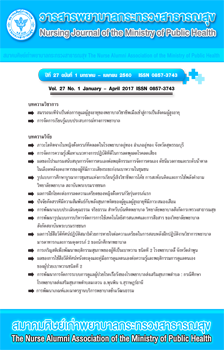ปัจจัยคัดสรรที่มีความสัมพันธ์กับพลังสุขภาพจิตของผู้ดูแลผู้สูงอายุที่มีภาวะสมองเสื่อม
Main Article Content
Abstract
บทคัดย่อ
การวิจัยครั้งนี้เป็นการวิจัยเชิงบรรยายเพื่อศึกษาความสัมพันธ์ ระหว่างอายุของผู้ดูแล ระยะเวลาในการดูแลผู้สูงอายุที่มีภาวะสมองเสื่อม รายได้ของผู้ดูแล ระดับความบกพร่องทางการรู้คิดของผู้สูงอายุที่มีภาวะสมองเสื่อม การรับรู้สมรรถนะตนเองของผู้ดูแล และการสนับสนุนทางสังคมกับพลังสุขภาพจิตของผู้ดูแลผู้สูงอายุที่มีภาวะสมองเสื่อม เครื่องมือที่ใช้ในการวิจัยเป็นแบบสอบถามและเวชระเบียนของโรงพยาบาล วิเคราะห์ข้อมูลโดยใช้สถิติเชิงพรรณนา สัมประสิทธิ์สหสัมพันธ์ของเพียร์สัน และสัมประสิทธิ์สหสัมพันธ์สเปียร์แมน
ผลการวิจัยพบว่า การรับรู้สมรรถนะตนเองด้านการดูแลตนเองและการได้รับการช่วยเหลือเมื่อต้องการพัก ด้านการตอบสนองต่อพฤติกรรมที่วุ่นวายของผู้ป่วย และด้านความสามารถในการควบคุมความคิดที่ไม่ดีเกี่ยวกับการดูแลมีค่าเฉลี่ยเท่ากับ72.15 (SD=20.07), 72.84 (SD=13.03),72.23 (SD=13.20) ตามลำดับ มีแรงสนับสนุนทางสังคมโดยรวมอยู่ในระดับสูง (Mean=3.98, SD= .38) มีค่าเฉลี่ยพลังสุขภาพจิตอยู่ในเกณฑ์ปกติ (Mean=66.59, SD=6.97) และพบว่าอายุของผู้ดูแล ระดับความบกพร่องทางการรู้คิด การรับรู้สมรรถนะตนเองและการได้รับการช่วยเหลือเมื่อต้องการพัก ด้านการตอบสนองต่อพฤติกรรมที่วุ่นวายของผู้ป่วย ด้านความสามารถในการควบคุมความคิดที่ไม่ดีเกี่ยวกับการดูแล และการสนับสนุนทางสังคมมีความสัมพันธ์ทางบวกกับพลังสุขภาพจิต อย่างมีนัยสำคัญทางสถิติ (r=.22-.45, p<.05) ผลการศึกษาครั้งนี้เป็นแนวทางในการพัฒนาแนวปฏิบัติหรือโปรแกรมทางการพยาบาลเพื่อส่งเสริมพลังสุขภาพจิตของผู้ดูแลผู้สูงอายุที่มีภาวะสมองเสื่อม
Selected Factors Related to Resilience in Family Caregivers of
Older Adults with Dementia*
Saowanit Noimongkon**
Wilaipun Somboontanont***
Venus Leelahakul***
Abstract
This descriptive research aimed to investigate the relationships between age of caregivers, duration of caring for older adults with dementia, income of caregivers, perceived self-efficacy of caregivers, cognitive impairment level of older adults with dementia, social support, and resilience of family caregivers of older adults with dementia. The instruments used were questionnaires and hospital records. Data were analyzed using descriptive statistics, Pearson’s product-moment correlation and Spearman rank correlation.
The findings revealed that the self-efficacy of caregivers’ mean scores in aspects of self-efficacy obtaining respite, responding to disruptive behaviors, and controlling upsetting thoughts were 72.15 (SD=20.07), 72.84 (SD=13.03),72.23 (SD=13.20), respectively. The mean score of social support was at a high level (Mean=3.98, SD= 0.38), and the mean score of resilience was at a normal level (Mean = 66.59, SD=6.97). The analysis of relationships between the selected factors and resilience of the caregiver found that age of the caregiver, cognitive impairment level of the older adults with dementia, self-efficacy in obtaining respite, self-efficacy responding to disruptive behaviors, self-efficacy controlling upsetting thoughts, and social support of the caregiver were positively related to the resilience at 0.05 level of statistical significance (r=.22-.45, p<.05). The findings of study would be beneficial to develop a practice guideline for nurses or nursing interventions to promote resilience in family caregivers of older adults with dementia.
Article Details
บทความและรายงานวิจัยในวารสารพยาบาลกระทรวงสาธารณสุข เป็นความคิดเห็นของ ผู้เขียน มิใช่ของคณะผู้จัดทำ และมิใช่ความรับผิดชอบของสมาคมศิษย์เก่าพยาบาลกระทรวงสาธารณสุข ซึ่งสามารถนำไปอ้างอิงได้

